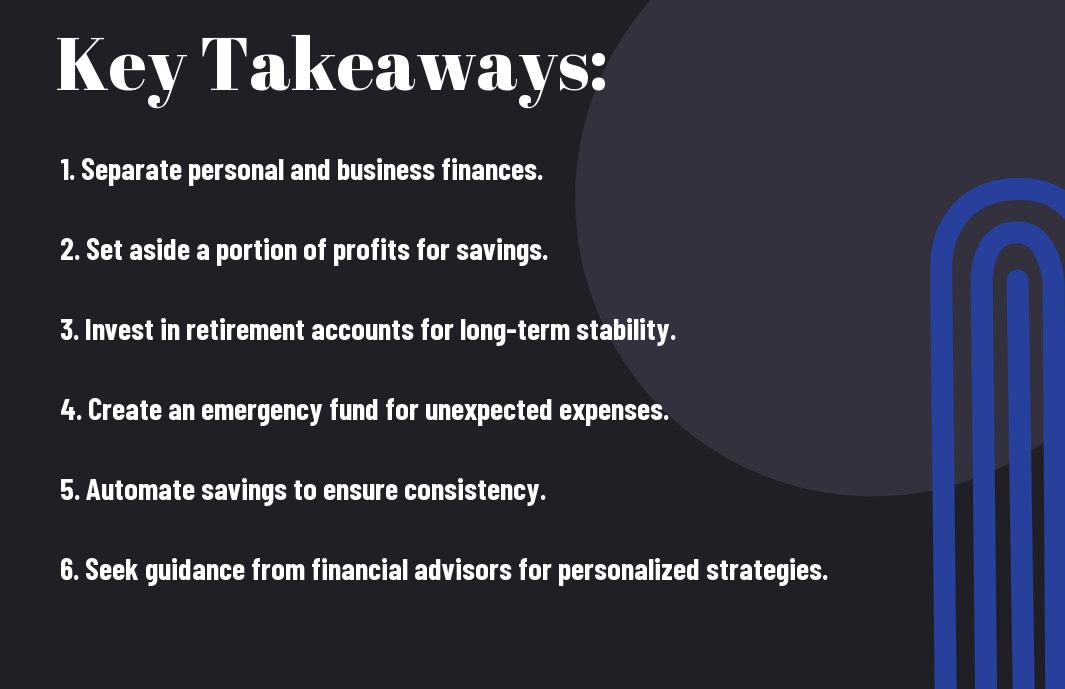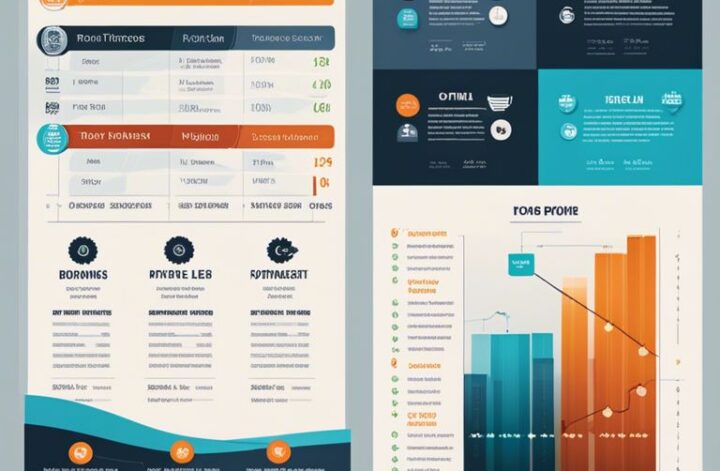Just as entrepreneurs focus on growing their businesses, it is crucial for them to also prioritize their personal financial stability. Finding the right balance between reinvesting in the business and saving for the future is key to long-term success. In this blog post, we will explore savings strategies specifically tailored for entrepreneurs, helping them navigate the challenges of managing cash flow, unexpected expenses, and planning for the future.
Key Takeaways:
- Create a separate savings account: Establish a dedicated savings account solely for personal finances to ensure that personal and business expenses are kept separate.
- Set a monthly budget: Monitor personal spending and establish a monthly budget to ensure that personal expenses are covered while reinvesting profits back into the business.
- Automate savings: Set up automatic transfers from business revenue into personal savings to ensure consistent savings without the need for manual intervention.
- Monitor and adjust: Regularly review and adjust savings strategies as business needs and personal financial goals evolve to ensure continued growth and stability.
- Invest in retirement planning: Consider establishing retirement accounts such as a 401(k) or IRA to secure long-term financial stability while also taking advantage of potential tax benefits.
Understanding Your Finances
Assessing Personal and Business Financial Health
For entrepreneurs, it is crucial to assess both personal and business financial health to ensure long-term sustainability. Clearly understanding your current financial position can help you make informed decisions about savings strategies. By analyzing your personal expenses and income alongside your business revenue and expenditures, you can identify areas where you may need to cut costs or increase savings to achieve a healthy financial balance.
It is recommended to regularly review your financial statements, track key performance indicators, and seek professional advice if needed. With a clear understanding of your financial health, you can develop a solid savings plan that supports both your business growth and personal financial stability.
Developing a Financial Plan
Business growth often requires strategic financial planning to ensure sustainable expansion. Developing a financial plan that accounts for both short-term operational needs and long-term growth aspirations is vital for entrepreneurs. By setting clear financial goals, budgeting effectively, and monitoring cash flow, you can avoid cash crunches and financial setbacks.
Assessing your current financial situation and projecting future expenses and income can help you make informed decisions about saving for emergencies, investments, and retirement. A well-thought-out financial plan can provide you with the confidence to navigate the ups and downs of entrepreneurship while prioritizing your personal financial stability.

Savings Mechanisms for Entrepreneurs
It is crucial for entrepreneurs to prioritize saving mechanisms that can help them achieve a balance between business growth and personal financial stability. One key strategy is to establish an emergency fund. Implementing emergency fund strategies tailored for entrepreneurs can provide a safety net during times of financial uncertainty. Consider exploring 5 Emergency Fund Strategies for Entrepreneurs to Consider for in-depth insights on building a financial cushion for unexpected expenses.
Traditional Savings Accounts and their Benefits for Entrepreneurs
Entrepreneurs can leverage traditional savings accounts to segregate personal and business finances effectively. A designated savings account can facilitate steady contributions towards both short-term and long-term financial goals. Additionally, having a separate savings account can aid in tracking personal expenditures, ensuring that entrepreneurs maintain a clear distinction between personal and business expenses.
Investments as a Form of Saving for the Future
On the path towards financial stability, entrepreneurs can consider investments as a form of saving for the future. By diversifying investment portfolios, entrepreneurs can generate passive income streams that complement their primary business revenue. Investment vehicles such as stocks, bonds, and real estate offer avenues for long-term wealth accumulation and can serve as a strategic approach to mitigate financial risks.

Allocating Profits Wisely
Reinvesting in Your Business vs. Personal Savings
For entrepreneurs, deciding on how to allocate profits can be a challenging task. Reinvesting in your business is crucial for growth, but it’s equally important to prioritize personal savings for financial stability. A good rule of thumb is to allocate a percentage of your profits towards business expansion, while also setting aside a portion for personal savings. By striking the right balance between reinvesting in your business and saving for the future, you can ensure both growth and stability in your financial journey as an entrepreneur.
When to Pay Yourself: Setting Salaries and Withdrawals
Any successful entrepreneur knows the importance of setting salaries and withdrawals at the right time. It’s important to pay yourself a fair wage for the work you do, but also to be mindful of the financial health of your business. Consider factors like cash flow, business expenses, and profit margins when determining your salary and withdrawal schedule. Plus, remember that a sustainable salary structure not only rewards your hard work but also contributes to the overall financial stability of your business.
Tax Considerations and Strategies
Many entrepreneurs overlook the potential tax savings that can be achieved through strategic planning. Maximizing tax-advantaged savings accounts can help entrepreneurs reduce their taxable income and keep more money in their pockets. By contributing to retirement accounts such as a Solo 401(k) or SEP IRA, entrepreneurs can take advantage of tax-deferred growth and potentially lower their current tax liabilities. Additionally, health savings accounts (HSAs) can be utilized to save pre-tax dollars for medical expenses, further reducing taxable income.
Maximizing Tax-Advantaged Savings Accounts
Strategies for entrepreneurs looking to maximize tax-advantaged savings accounts include contributing the maximum allowable amount each year to retirement accounts. By diligently saving in these accounts, entrepreneurs can benefit from tax-deferred growth and potentially lower their current tax liabilities. Exploring options such as SEP IRAs or Solo 401(k)s can provide additional flexibility and potential tax savings.
Planning for Tax Liabilities and Reducing Tax Burdens
Strategies for entrepreneurs include planning for tax liabilities throughout the year by setting aside a portion of income for future tax payments. Utilizing tax deferral strategies such as tax credits and deductions can help reduce overall tax burdens. Additionally, working with a tax professional can provide valuable insights and help entrepreneurs take advantage of all available tax-saving opportunities.
To ensure the long-term financial stability of their business and personal finances, entrepreneurs must carefully consider their tax liabilities and implement strategies to reduce tax burdens. By maximizing tax-advantaged savings accounts and planning for tax liabilities, entrepreneurs can strike a balance between growing their business and maintaining financial stability.
Managing Cash Flow for Savings Growth
Keep in mind the importance of balancing personal and business financial goals. It is crucial for entrepreneurs to manage their cash flow effectively in order to achieve financial stability. For more insights on this topic, you can refer to this informative article on Balancing Personal and Business Financial Goals.
Techniques for Improving Cash Flow
Improving cash flow is crucial for entrepreneurs looking to bolster their savings. Implementing strategies such as negotiating better payment terms with suppliers, reducing operational costs, and optimizing inventory management can help increase cash inflow and decrease outflow, resulting in a healthier financial position for your business.
Strategies for Building an Emergency Fund for Your Business
Techniques for building an emergency fund for your business can provide a safety net during times of economic uncertainty. By setting aside a portion of profits regularly and maintaining a separate savings account designated for emergencies, entrepreneurs can ensure they are prepared for unexpected expenses or downturns in the market. Cash reserves equivalent to at least three to six months’ worth of business expenses are typically recommended for optimal financial security.

Balancing Risk: Diversifying Your Savings
Understanding the Risk-Return Tradeoff
One of the fundamental principles of investing is the risk-return tradeoff. In simple terms, the higher the potential return of an investment, the higher the risk involved. As an entrepreneur, it’s crucial to understand this concept and apply it to your savings strategy. While it may be tempting to chase high returns, it’s important to assess the level of risk you are comfortable with and make informed decisions based on that.
The Role of Diversification in Protecting Your Finances
Balancing risk in your savings plan can be achieved through diversification. Diversification involves spreading your investments across different asset classes, industries, and geographical regions to reduce overall risk exposure. By diversifying your savings, you can protect yourself against potential losses in any one investment. This strategy can help you maintain financial stability while also positioning yourself for growth.
Balancing the different components of your portfolio is imperative to ensure that your savings are adequately protected. By diversifying your investments, you can hedge against market volatility and minimize potential losses. Note, the goal is not just to grow your savings, but also to safeguard them for the long term.
Future-Proofing: Saving for Retirement as an Entrepreneur
Not prioritizing savings for retirement as an entrepreneur can be a costly mistake in the long run. With the unpredictable nature of entrepreneurship, having a solid retirement savings plan in place is necessary to ensure financial stability in the later years.
Retirement Account Options for Business Owners
On the journey to building a successful business, entrepreneurs have several retirement account options to choose from that can help them save for the future. Options such as Individual 401(k) plans, SEP-IRA, SIMPLE IRA, and Roth IRA offer flexibility and tax advantages to business owners looking to save for retirement.
Estimating Retirement Needs and Planning Contributions
Saving for retirement as an entrepreneur involves estimating future retirement needs based on current income and lifestyle preferences. By calculating expected expenses in retirement and planning contributions accordingly, entrepreneurs can create a roadmap towards a financially secure retirement. It’s important to regularly review and adjust retirement savings goals as the business grows and income fluctuates.
Technological Tools and Resources
Utilizing Fintech for Budgeting and Savings
Once again, technological advancements come to the rescue of entrepreneurs looking to strike a balance between business growth and personal financial stability. By harnessing the power of financial technology (fintech), entrepreneurs can access a wide range of tools and resources to streamline their budgeting and savings efforts.
Apps and Software for Financial Tracking and Analysis
For entrepreneurs looking to take control of their finances and make informed decisions, utilizing apps and software for financial tracking and analysis is crucial. These tools can provide real-time insights into cash flow, expenses, and overall financial health, allowing entrepreneurs to identify areas for improvement and optimize their financial strategies. By leveraging these technological solutions, entrepreneurs can not only save time but also make smarter financial decisions that contribute to both business growth and personal financial stability.
It is imperative for entrepreneurs to explore the wide range of fintech options available to them, from budgeting apps to advanced analytics software. With the right tools in place, entrepreneurs can effectively manage their finances, track their progress, and make data-driven decisions to ensure long-term success.
Mindset and Habits for Financial Success
The Psychology of Saving: Overcoming Entrepreneurial Hurdles
To build a strong financial future as an entrepreneur, a shift in mindset and overcoming psychological barriers is crucial. Despite the unpredictable nature of running a business, implementing sound savings strategies is imperative. According to Building a Stronger Financial Future, it is important to prioritize saving, even during times of rapid growth, to ensure personal financial stability.
Developing Healthy Financial Habits for Long-Term Stability
To achieve long-term financial stability, entrepreneurs must establish healthy financial habits. Financial discipline is key to ensuring that personal finances are well-managed alongside business growth. A study by Building a Stronger Financial Future highlights the importance of consistent savings and budgeting to navigate the challenges of entrepreneurship.
A proactive approach to personal finance, including setting financial goals, creating a budget, and regularly reviewing expenses, is imperative for entrepreneurs. Developing a habit of saving a portion of profits, separating personal and business finances, and prioritizing emergency funds can provide a safety net in times of financial uncertainty.
Seeking Professional Advice
When to Consult a Financial Advisor
Advice from financial professionals can be instrumental in helping entrepreneurs make informed decisions regarding their personal and business finances. It is crucial to seek the guidance of a financial advisor, especially during critical milestones in your business, such as seeking investment, expanding operations, or planning an exit strategy. A financial advisor can assist in developing a comprehensive financial plan tailored to your specific entrepreneurial goals, ensuring a balance between business growth and personal financial stability.
Building a Team of Financial Experts
On the journey to financial success as an entrepreneur, building a team of financial experts is crucial. This team can include professionals such as accountants, tax advisors, and wealth managers, among others, who can provide specialized guidance in different aspects of your finances. By enlisting the expertise of professionals in various fields, entrepreneurs can access insights and strategies that can contribute to both long-term business growth and personal financial stability.

Summing up
The key to success as an entrepreneur lies in effectively balancing business growth with personal financial stability. By implementing strategic savings strategies, entrepreneurs can secure their financial future while also fueling the growth of their businesses. It is crucial for entrepreneurs to prioritize their personal finances by setting clear financial goals, creating a budget, and regularly reviewing their expenses to identify areas where savings can be maximized.
Entrepreneurs should also focus on building an emergency fund for unexpected expenses and consider investing in retirement accounts to secure their long-term financial stability. By being proactive and disciplined in their savings approach, entrepreneurs can navigate the ups and downs of business ownership with confidence and ensure a solid financial foundation for both their personal and professional lives.




